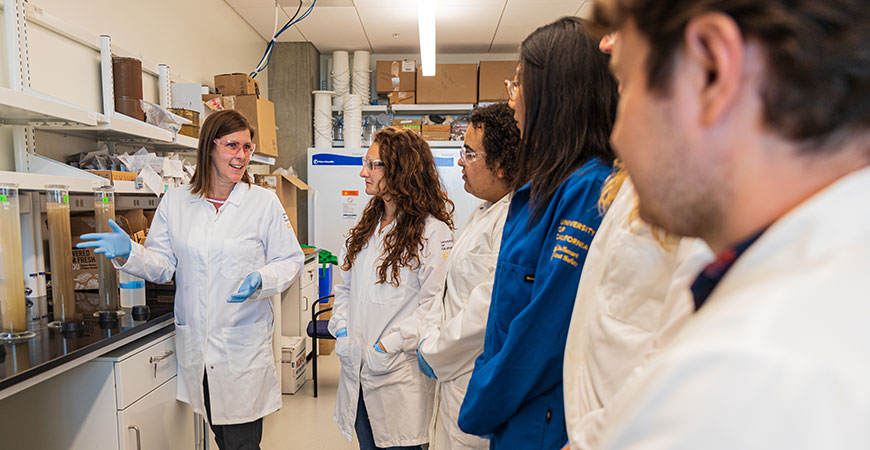
Human waste isn’t a topic most people want to talk about.
But environmental systems Professor Rebecca Ryals embraces the subject, especially when it comes to mitigating climate change, improving public health and creating sustainable food systems.
In a recent publication in Frontiers in Sustainable Food Systems, Ryals and a group of colleagues show that ecological sanitation systems can be used to capture human waste and use it to generate organic nutrients that increase crop yield to feed more people, assist soils in sequestering more carbon and provide cleaner sanitation systems.
“The organic matter we expel is often wasted, and it causes problems,” Ryals said. “We should think about not wasting the resources embedded in that material.”
In Haiti, for example, sanitation and clean water are immense public health challenges. Many people do not have the kinds of toilet systems people in the U.S. are used to — like two-thirds of the world, many Haitians use pit latrines or lagoons, which can spread disease and contaminate water supplies.
Ryals and her colleagues, including scientists in Haiti, have been using a combination of container-based household toilets and aerobic, thermophilic composting to conducting greenhouse experiments.
They found that capturing human waste and transforming it into an agricultural resource increases crop yields, improves soil health and allows it to capture more carbon, which decreases greenhouse gas emissions. In a previous Ryals study, climate benefits were also observed during the composting process compared to other waste management processes. The composting toilet systems offer clean sanitation solutions to many households, keeping human waste away from the public and water supplies. Composting human waste has also been shown to offer new employment opportunities for people in impoverished Haiti.
One of Ryals’ coauthors, Suzanne Pierre, founder and director of the Critical Ecology Lab in Santa Rosa, evaluated the study’s results within a decolonial context.
“Nutrient cycling and recapture through ecological sanitation is not only an environmentally sustainable waste technology, but it also may address a bigger-picture problem in Haiti: Foreign imperialism over centuries has maintained instability and dependence on external resources within Haiti,” Pierre said. “Because nutrients are the basis of agricultural productivity, returning organic nutrients to the soil — rather than depending on imported synthetic fertilizers for farming — may be a way of shifting toward greater domestic stability and is a decolonial act.”
The Critical Ecology Lab conducts original, collaborative and peer-reviewed interdisciplinary research to uncover and alleviate the connections between social inequality and environmental degradation. By focusing on critical ecology, the lab combines theories and methods of ecological and Earth science research with the analytical lens of decolonial studies, Pierre explained.
“This paper is unique in that it bridges the technical and the social dimensions of what ecological sanitation may mean in the context of Haiti,” Pierre said. “It's part of a growing number of papers that model how to connect ecological analysis with critical social theory.”
She and Ryals have known each other through their fields of study for many years and became collaborators through their mutual interest in nutrient cycling in Haiti. Ryals is also a mentor and member of the Critical Ecology Lab advisory board.
For Ryals, the next step is to move the greenhouse experiments out into the fields to see if the results will vary. For Pierre, the hope is that eco sanitation can be expanded in Haiti.
She doesn’t think people in Haiti will have any issues in adopting these new practices.
“Haitian communities have great pride for and desire to improve their local and national communities. Adoption of new sanitation approaches is more about the quality and thoughtfulness of the design and implementation than it is about individual citizens’ willingness to try new practices,” she said.
But in the U.S., it might be a little more difficult to talk people into the idea of human waste as anything more than something to be flushed.
Ryals has been working on land-based carbon sequestration studies in the San Joaquin Valley with growers who have been using biosolids — the residue left after wastewater treatment — on their fields for many years.
“There is an ‘ick’ factor for many. Acceptance varies regionally,” she said. “In Haiti, people see the benefits, so acceptance is high. But in other places, there needs to be cultural shifts. Like many others, I’m trying to use whatever tools I can to help solve these problems here and globally.”
Lorena Anderson

Senior Writer and Public Information Representative
Office: (209) 228-4406
Mobile: (209) 201-6255






